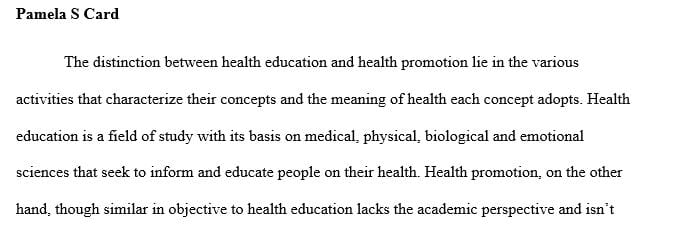What is the difference between health promotion and health education
What is the difference between health promotion and health education?
If lifestyle contributes to over 50% of all health care problems, how would you, as a community health nurse, identify priorities for risk reduction and health education programs in your community?
Discuss an example of a lifestyle related health problem from your community and how you would address it.
NEWI researched same condition but different age group, child with disability and adult with disability. According to the website IDEA or Individuals with Disability Education Act, “a child with a disability evaluated in accordance with §§300.304 through 300.311 a child as having an intellectual disability, a hearing impairment including deafness, a speech or language impairment, a visual impairment including blindness, a serious emotional disturbance (referred to in this part as “emotional disturbance”), an orthopedic impairment, autism, traumatic brain injury, an other health impairment, a specific learning disability, deaf-blindness, or multiple disabilities, and who, by reason thereof, needs special education and related services” (IDEA, 2017). Disability in individual according to the administration of social security states that, “The law defines disability as the inability to engage in any substantial gainful activity by reason of any medically determinable physical or mental impairments which can be expected to result in death or which has lasted or can be expected to last for a continuous period of not less than 12 months” (Social Security Administration, n.d.). Disability in children is considered when they are under age of 18 but the definition applies to both of them and the only difference between adult and children is the age (Social Security Administration, n.d.).
The Center for Disease Control and prevention gives a good insight to health care providers regarding patients with disability and brings an interesting but important point; whether the patient has disability or not the provider should treat them equally with respect and dignity (The Centers for Disease Control and Prevention, 2019). It is important for health care providers to remember that we have to be aware of how to meet patients care and communicate based on patient’s range of disabilities but treat them as a human not someone with disability (The Centers for Disease Control and Prevention, 2019).
Reference
The Centers for Disease Control and Prevention. (2019). Disability and Health Information for Health Care Providers. Retrieved from https://www.cdc.gov/ncbddd/disabilityandhealth/hcp…
IDEA. (2017). Sec. 300.8 Child with a disability. Retrieved from https://sites.ed.gov/idea/regs/b/a/300.8
Social Security Administration. (n.d.). Disability Evaluation Under Social Security. Retrieved from https://www.ssa.gov/disability/professionals/blueb…
following two discussions require response no later than Sunday. each of them requires reference. Please know that the actual question is what health means for different people such as young adult, people with disability . as you can see its not about what heath is. please pay attention to the questions. I can’t afford to lose points.if health care is not your strong point please let me know , this class is very important to me .
Answer preview to what is the difference between health promotion and health education
APA
321 words
Get instant access to the full solution from yourhomeworksolutions by clicking the purchase button below


